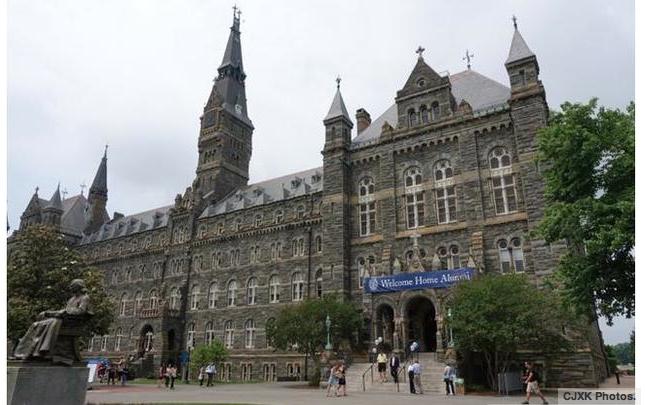Georgetown University to Apologize for Slavery Past, Give Slave Descendants Admission Priority
By • September 1, 2016 0 958

Continuing to recognize and atone for its slavery past, Georgetown University announced today the recommendations of its Working Group on Slavery, Memory, and Reconciliation, charged one year ago to provide specific answers on how the university should respond to its history.
Georgetown University President John DeGioia is speaking at 4 p.m. today, Sept. 1, outlining the steps the university is taking — including giving descendants of enslaved persons owned by the Jesuits the same preference given university applicants whose parent or grandparent attended the school.
In 1838, the university sold 272 slaves, who worked at Maryland plantations, owned by the Jesuits. Part of the proceeds from the slave sale — translating in monetary terms to roughly $3.25 million in today’s dollars — paid off Georgetown College’s debts and helped the school expand. At the same time, the school split up families — expressly forbidden by its superiors in Rome — and literally sold down them down the river, mostly to Louisiana.
Georgetown University — founded in 1789, before Washington, D.C., existed — is the oldest Catholic and Jesuit institution of higher learning in the United States.
Only recently did the details of its slavery past come to light, but the university has taken the lead in confronting its past. DeGioia traveled to Louisiana and elsewhere during the summer to meet descendants of Georgetown’s slaves.
The following is part of the university’s Sept. 1 announcement.
In a message to the community today, DeGioia announced actions that the university will take to engage its history with slavery and engage with descendants in new ways:
• Offering a Mass of Reconciliation in conjunction with the Archdiocese of Washington and the Society of Jesus in the United States, and engaging the Georgetown community in a “Journey of Reconciliation”;
• Naming the building Freedom Hall (once known as Mulledy Hall) as Isaac Hall and naming the building Remembrance Hall (once known as McSherry Hall) as Anne Marie Becraft Hall;
• Engaging descendants and members of our community in developing a shared understanding, determining priorities, and creating processes and structures;
• Establishing a living and evolving memorial to the slaves from whom Georgetown benefitted and establishing a Working Group, including descendants of those slaves, to advise on its creation;
• Establishing the Institute for the Study of Slavery and Its Legacies at Georgetown to support the continued, active engagement with descendants, sustained research and other actions;
• Giving descendants the same consideration we give members of the Georgetown community in the admissions process;
• Strengthening Georgetown’s Library and its Special Collections to promote scholarship in the field of racial justice and deepen archival resources to support genealogical work;
• Working to identify new ways to enhance access and opportunity for those who wish to attend college and continue to support schools like Cristo Rey that seek to provide stronger pathways to higher education.
“As we join the Georgetown community we must understand that part of our history is this history of slaveholding and the slave trade,” said David Collins, S.J., chair of the university’s Working Group on Slavery, Memory, and Reconciliation. “And that opens our eyes to broader social issues that are still unhealed in our nation. History matters up to the present and into the future.”

